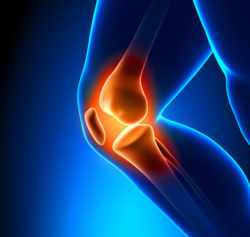 In March 2015, Zimmer issued a voluntary recall of its Persona tibial plate after it had spent less than three years on the market. The tibial plate is part of the Zimmer knee replacement system.
In March 2015, Zimmer issued a voluntary recall of its Persona tibial plate after it had spent less than three years on the market. The tibial plate is part of the Zimmer knee replacement system.
Some of the symptoms reported in conjunction with a failing Persona tibial plate include: persistent pain, loosening of the implant, premature device failure, loss of mobility, inflammation, knee instability, and knee tightness.
A failing tibial plate may appear through X-rays that portray signs of gaps between the knee implant and the bone, which appear as radiolucent lines. These lines may be a sign of poor seating.
Zimmer’s Persona Tibial Plate Overview
The Zimmer Persona Trabecular Metal tibial plate is a component of the total knee replacement system. The tibial plate is implanted into the bone and attached to the tibia. Part of this component of the Zimmer knee replacement includes two pegs. These two pegs are implanted into the tibia and grow into the bone to allow and provide for increased stability and range of motion.
In February 2015, Zimmer announced its voluntary recall due to it receiving numerous complaints of Zimmer knee replacement issues.The recall impacted more than 12,000 Zimmer knee replacement components. There were two main issues surrounding the Zimmer knee replacement component, namely loosening and radiolucent lines.
Zimmer’s voluntary recall of its knee replacement component was due in part to reports that the tibial plate came loose from where it was attached. Revision surgery from those who underwent a total knee arthroplasty with the Zimmer knee replacement component was the most prevalent issue resulting from the loosening of the device.
The second issue with the component of the Zimmer knee replacement system included radiolucent lines. When there are gaps that are shown via X-rays between the knee replacement device and the bone, this illustrates a sign of poor seating of the device. Radiolucent lines that are visible through X-rays, which also show these gaps, are the initial signs for loosening of the device.
Once Zimmer announced its voluntary recall in January 2015, the U.S. Food and Drug Administration followed by announcing the voluntary recall in March 2015. It labeled the voluntary recall as a “Class 2 Recall” categorized for medical devices and drugs that may cause temporary or reversible harm.
There are several reasons cited that required patients to have to undergo revision surgery. Some of these reasons included: persistent pain, loosening of the device, lack of ingrowth, component failure, loss of fixation, globally tight knee, instability, fracture, and patella tracking issues.
Although revision surgery is a solution for patients who complain of loosening and radiolucent lines, there are additional risks and complications involved for patients to undergo revision surgery. Some of these adverse risks include: infection; pain and swelling; nerve, tissue, or blood vessel damage; blood clots; bone loss; fractures; and leg length discrepancies.
Do YOU have a legal claim? Fill out the form on this page now for a free, immediate, and confidential case evaluation. The knee implant attorneys who work with Top Class Actions will contact you if you qualify to let you know if an individual lawsuit or class action lawsuit is best for you. [In general, knee implant lawsuits are filed individually by each plaintiff and are not class actions.] Hurry — statutes of limitations may apply.
ATTORNEY ADVERTISING
Top Class Actions is a Proud Member of the American Bar Association
LEGAL INFORMATION IS NOT LEGAL ADVICE
Top Class Actions Legal Statement
©2008 – 2025 Top Class Actions® LLC
Various Trademarks held by their respective owners
This website is not intended for viewing or usage by European Union citizens.
Get Help – It’s Free
Join a Free Zimmer Persona Knee Recall Lawsuit Investigation
An attorney will contact you if you qualify to discuss the details of your potential case at no charge to you.
Please Note: If you want to participate in this investigation, it is imperative that you reply to the law firm if they call or email you. Failing to do so may result in you not getting signed up as a client, if you qualify, or getting you dropped as a client.
E-mail any problems with this form to:
[email protected].
Oops! We could not locate your form.












